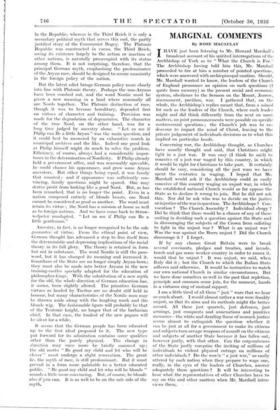MARGINAL COMMENTS
By ROSE MACAULAY
IHAVE just been listening to Mr. Howard Marshall's broadcast account of his spirited interrogations of the Archbishop of York as to " What the Church is For." The Archbishop having told him this, Mr. Marshall ppoeeeded to fire at him a number of pointed questions, which were answered with archiepiscopal caution. Should, Mr. Marshall wanted to know, the leaders of the Church of England pronounce an opinion on such questions (I quote from memory) as the present social and economic system, obedience to the Sermon on the Mount, Jarrow, rearmament, pacifism, war. I gathered that, on the whole, the Archbishop's replies meant that, from a mixed lot such as the leaders of the Church, where each leader might and did think differently from the next on most matters, no joint pronouncements were possible on specific controversial questions ; the Church's job was to en- deavour to impart the mind of Christ, leaving to the private judgement of individuals decisions as to what this implied on particular heads.
Concerning war, the Archbishop thought, as Churches have usually thought and said, that Christians might fight in a just war. It was easy (I think he said) to conceive of a just war waged by this country, in which it would be right for Christians to take part. It certainly should be easy, considering all the just wars we have spent the centuries in waging. I hoped that Mr. Marshall would ask if the Archbishop could as easily conceive of this country waging an unjust war, in which the established national Church would so far oppose the State as to declare it wrong to join. But he did not ask this. Nor did he ask who was to decide on the justice or injustice of the war in question. The Archbishops ? Con- vocation ? The Church Assembly ? Individual clergy ? Did he think that there would be a chance of any of these uniting in deciding such a question against the State and in discouraging the subjects of the Crown from enlisting to fight in the unjust war ? What is an unjust war ? Was the war against the Boers unjust ? Did the Church discourage it ? I forget.
If by any chance Great Britain were to break several covenants, pledges and treaties, and invade, bomb and gas some weaker country in order to annex it, would that be unjust ? It was unjust, we said, when Italy did it ; but the Church to which the Italian State adheres said otherwise. It would be instructive to watch our own national Church in similar circumstances. But we have done ourselves so well in the past that repletion, principle and common sense join, for the moment, hands in a virtuous ring of mutual support.
I am a little tired of all these " just " wars that we hear so much about. I would almost rather a war were frankly unjust, so that its aims and its methods might the better accord. All these just quarrels, just defences, just armings, just conquests and annexations and punitive measures—the white and dazzling flame of so much justice seems almost to extinguish the question whether it can be just at all for a government to make its citizens and subjects turn savage weapons of assault on the citizens and subjects of another State because it has fallen out, however justly, with that other. Can the corporateness of the State justly comprise the inciting of millions of individuals to violent physical outrage on millions of other individuals ? Do the words " a just war," so easily uttered by each nation when they prepare to wage one, really, in the eyes of the leaders of Churches, answer adequately these questions ? It will be interesting to hear what the representatives of other Churches have to say on this and other matters when Mr. Marshall inter- views them.




















































 Previous page
Previous page